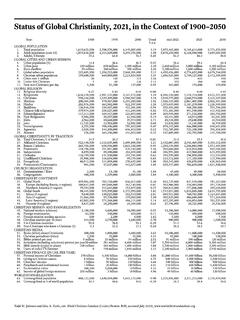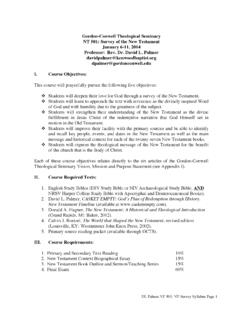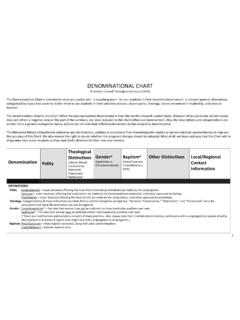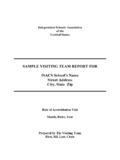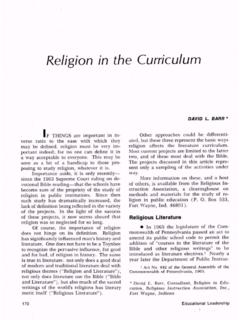Transcription of Church-based Entrepreneurship
1 1. Mockler Memo #9 Summer 2014 Essay Church-based Entrepreneurship by David W. Gill Not just in the USA but around most of the world people are struggling to find jobs. Some of this unemployment challenge is due to technology replacing human labor with machines. Some of it is due to social and political breakdowns such as warfare, violence, and corruption. Some of it is due to famine, disease, and natural disasters. Some of it is due to ignorance --- not knowing how to work. And some is due to the lack of a good work ethic --- motivation, honesty, diligence, responsibility, and so on. The absence of jobs and work is a huge factor in poverty of course. It is a survival issue. People need work to be able to eat and find shelter and basic necessities. But unemployment or joblessness also brings with it a loss of human dignity and a squandering of gifts and abilities God grants to each of us.
2 Every man, woman, and child on earth was made in the image and likeness of our Creator, Sustainer, Redeemer God and is dehumanized if not able to do some creative, sustaining, redemptive work of some type. We need jobs to be able to survive and provide for our families. We also need jobs to be able to create goods and services that meet the needs of the people and glorify our Lord. All of us need jobs simply to express who we are as men and women made in the image of God the Creator and Redeemer. Neither government programs nor trickle-down business growth will ever be able to create enough quality jobs for our communities. Rather than just looking to existing businesses or to government agencies to create jobs, let's ask what can the church do? Rather than blaming Washington or Wall Street let's rise up with God's help and do something in the church !
3 Within our churches are simultaneously many who need and want to find meaningful work --- and others with skills, experiences, networks, resources to help their brothers and sisters find or create new business and work opportunities. Training Seminarians to Coach Entrepreneurs With the generous assistance and vision of the Kern Family Foundation, Gordon-Conwell Theological Seminary's Boston campus (CUME --- Center for Urban Ministerial Education ) has recently completed the second year of a program to train current and future church leaders in Church-based Entrepreneurship .. What follows is a description of that program and its results to date. We see this as a great model for other theological seminaries and Christian educational institutions. But we also see our ultimate goal as mobilizing local, parish churches to undertake similar initiatives and make them a regular, long-term, ongoing, vital part of their ministry.
4 Just as churches can help provide some primary and preventative health care to their congregations and communities, just as they can provide some basic educational and skills training, just as they can step forward with sports and music and arts programs in their communities, churches can bear witness to the Gospel by efforts to create jobs and businesses. Our course Entrepreneurship in church and Community was co-led by David Gill and Larry Ward the past two years. Gill has been a serial entrepreneur for decades, mostly in the educational world. He is a professor of workplace theology and business ethics but has long experience working as an MBA ethics teacher and small- and medium-size business consultant. Ward is long time pastor of Abundant Life church 2014 Mockler Memo #9 Summer 2014 David W.
5 Gill 2. in Cambridge but has years of experience as a credentialed Entrepreneurship trainer, especially working with urban young people. These two lead instructors did most of the teaching and coaching but occasionally brought in guest expert presenters to talk about financial and accounting systems, using technology and media, or other topics. They also brought in both recent and veteran entrepreneurs to share their experiences and counsel. The course used three basic reading resources: (1) the inspiring best-seller, The $100 Start-Up by Chris Guillebeau (2012), (2) the big manual Start Your Own Business (Entrepreneur Press, 5th edition, 2010), and (3) the Bible. We had roughly a dozen students enrolled in each of our semester-length courses that met for one three- hour session each week for twelve weeks.
6 We think that our Saturday morning version worked a little better than our Tuesday evening one. Our officially enrolled students were primarily seminary-degree seeking students but we also had some alumni and special non-degree students who were part of our course. Since few seminary graduates were ever able to take a course like this during their own seminary days, we believe that bringing veteran church leaders and alumni back for courses like this is every bit as important as enrolling current students. The Kern Family Foundation provided tuition grants that covered at least half the normal cost of a course like this. Characteristics of High Potential Entrepreneurs At our first class meeting we met our students, reviewed the jobs and employment challenge and the biblical basis for our response.
7 Then we reviewed the characteristics of a promising entrepreneur. This is what each of our students should look for in their prospective entrepreneur, someone in their church or community who wanted to start a business. Someone who is most likely to succeed as an entrepreneur, starting a new business or organization will have many of the following character traits: 1. Creative. Lots of ideas. Thinking outside the box. Innovative. Inventing a third way when others seem stuck on two undesirable alternatives. 2. Determined. Dedicated, persistent. A real pit bull who won't give up even when the going gets tough. Even when you are alone and it's all on you, you keep plugging away. 3. Passionate. Invested. Totally into the project with blood, sweat, and tears. This is your baby, your reputation at stake.
8 You willingly accept responsibility. 4. Risk-taker. This is new. You are out there on a limb. No guarantees. Not reckless or foolish but still reaching out and taking the right risks. 5. Prayerful. You need and want God along to guide and help at every moment, every step of the journey. You pray daily. You ask your pastor and church and friends to pray for you. 6. Integrity. Totally honest, transparent, above board. No games, no patience with unethical, wrong, cheating, dishonest people and practices. 7. Teachable. Always eager to learn something new every day from every possible source: people, reading, competitors. You are a life-long learner. You know you don't know everything. 8. Team-builder. You can't do it all by yourself. You gather an informal posse or kitchen cabinet.
9 Around you. You partner with or hire quality people with complementary gifts. 9. Detail-fanatic. You can't tolerate sloppiness or careless mistakes or shoddy financial records or less than excellent products and services. 10. Communicative. You engage people with a smile and tell them the honest good news about your business, products, customers, and plans. You own up to the truth. You are respectful. We gave our students a simple application form to use with their wannabe entrepreneurs to make sure they understood the nature of the challenge and were seriously committed to the project. We reviewed 2014 Mockler Memo #9 Summer 2014 David W. Gill 3. these applications and approved the entrepreneurs: one entrepreneur for each enrolled student who would serve as mentor and coach for the entrepreneur.
10 Basic Training for Entrepreneurs By the second or third week of the course we urged our entrepreneurs to come to class alongside their mentors. Having both the mentor and the entrepreneur side-by-side in class really facilitated communication. Every week we spent time in some Bible study and prayer about different aspects of faith at work. We prayed together at the beginning and end of each class. Honestly, our class meetings were much more than business training --- they were often full of passion and energy and even worship. The Kern Family Foundation gave a small grant to help each start-up get off the ground. We helped each of our entrepreneurs set up a dedicated business checking account (we did not allow the start-up money to be mingled in with other household money and bills).



